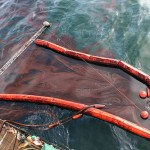On day 81 of the Gulf oil disaster, as millions of gallons of oil continue to spew, estimates of the Deepwater Horizon discharge continue to vary widely between 35,000-60,000 barrels per day.

National Incident Commander Thad said in a briefing on Thursday that a very, very aggressive program with skimming equipment was now in place. He recalled the recent bad weather which had forced most of the smaller vessels of opportunity to cease skimming operations. But he said that the skimming vessels are coming back with improved weather, putting out skimming equipment.
Allen informed that it is likely a third production platform, the Helix Producer, could be hooked up to the current containment cap of the leaking well that would bring the entire collection capability up to between 50,000 and 53,000 barrels a day.
Allen also said that good progress on the relief wells continued, now within a couple hundred feet of the proposed penetration point of the well bore and at a depth of 17,780 measured feet. While the target date for sealing the well remains mid-August, it is possible that this could take place a few weeks earlier.
Meanwhile, in Florida, tar balls, tar patties and sheen continue to be reported in Northwest Florida.
According to the governor’s report of July 8, five state-leased skimmers continue to operate in Northwest Florida to protect sensitive inland water bodies. The skimmers are operating at the passes in Escambia, Okaloosa, Bay, Gulf and Fanklin counties.
Regarding boom placement, 442,400 feet of hard boom and 8,250 feet of sorbent boom have been place in Northwest Florida along the most sensitive areas.
NOAA on July 4, revised the commercial and recreational fishing closure in the oil impacted areas of the Gulf of Mexico. The new closure measures 81,181 square miles and leaves 66 percent of Gulf federal waters still available for fishing.
There is increasing concern that the very high toxicity levels in the gulf are making clean-up workers sick. A growing number of environmental organizations, experts, political leaders and thousands of Americans are calling on President Obama and the federal government to demand that BP allows every clean up worker who wants to wear respiratory protective equipment to do so.


